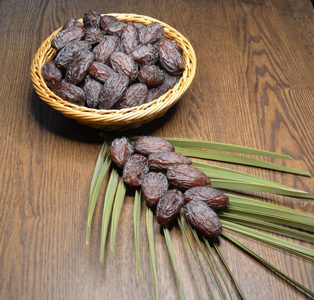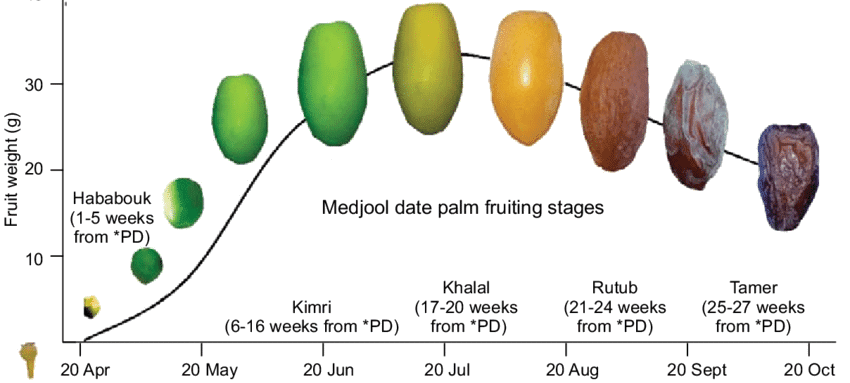
How Medjool dates are grown?
Date palm trees produce all dates. There are have both male and female palms trees. The male palms' main role is to pollinate the female palms. After this task, they remain inactive for the rest of the year while the female palms bear fruit. Its very similar to the way humans reproduce.
Cultivating Medjool dates is a labor-intensive process, often described by growers as labor of love. It takes 4 to 7 years for a palm tree to begin producing fruit. Once this stage is reached, growers must meticulously tend to the dates by climbing up and down the trees 12-15 times per year. These areas where dates are grown are referred to as "date gardens" or "date groves" by farmers, not fields.
Life Stages of Egyptian Medjool dates

Harvesting techniques of Medjool date
Harvesting of Medjool dates on right time is important to get the best flavor and texture. Generally, in Egypt, the harvest time begins from late summer to early autumn from September to October. However, the timing can change due to weather and growing conditions.
Experienced harvesters visually inspect the date clusters to determine their readiness for harvest. Mature Medjool dates are plump, soft, and have a rich, caramel-like color. They should also be slightly wrinkled, indicating high sugar content.
Harvesters conduct manual tests to assess the ripeness of the dates. Gently squeezing the fruit to check for softness and observing the ease with which the dates separate from the bunch.
Sometimes, harvesting Medjool dates requires workers to climb ladders to reach the fruit because the date palms can grow quite tall. Specialized harvesting ladders are designed to be safe and stable for workers to ascend and descend.
Each date cluster is carefully hand-picked to avoid damaging the fruit or the palm tree. Harvesters use sharp curved knives or sickles, to cut the clusters from the palm tree. Extra Care must be taken to avoid injuring the palm or causing unnecessary stress to the tree.
Harvesters should wear gloves and long sleeves to protect their hands and arms from scratches and abrasions while working among the date palms.
After harvesting, the date clusters are collected in containers or baskets and transported to sorting facilities. Here, they are inspected again to remove any damaged or unripe fruit.
Development Efforts For Cultivation in the Arab Republic of Egypt
 Strategic Industrial Development: Egypt's attention to the date sector is part of a broader strategy to develop industrial and export sectors with a competitive advantage. This reflects the country's commitment to economic diversification and growth.
Strategic Industrial Development: Egypt's attention to the date sector is part of a broader strategy to develop industrial and export sectors with a competitive advantage. This reflects the country's commitment to economic diversification and growth.
Climatic Advantage for Agriculture: Egypt's suitability for Medjool date cultivation is attributed to favorable climatic conditions and ample arable land areas. These natural advantages contribute to the country's agricultural productivity and competitiveness.
Geopolitical Positioning: Egypt's unique geographical location serves as a strategic advantage, facilitating trade agreements and free trade arrangements with various regions, including the European Union, the Mediterranean basin, Arab countries, Africa, the Maghreb, Turkey, and South America. This enhances Egypt's international competitiveness in date exports.
Investment in Agricultural Infrastructure: Egypt is home to numerous large-scale investment farms specializing in date cultivation. These farms adhere to international quality regulations and contribute to the country's agricultural modernization and productivity.
Future Date Production Project: Egypt is currently establishing the largest date production project in the region, covering an extensive area and aiming to cultivate millions of date palm trees. This project underscores Egypt's commitment to expanding its agricultural capacity and maximizing the value of date production.
Regional Collaboration: Egypt advocates for the integration of Arab efforts in date palm cultivation, recognizing the collective responsibility and potential for maximizing the added value of date production across Arab countries. This collaborative approach reflects Egypt's commitment to regional cooperation and economic development.
